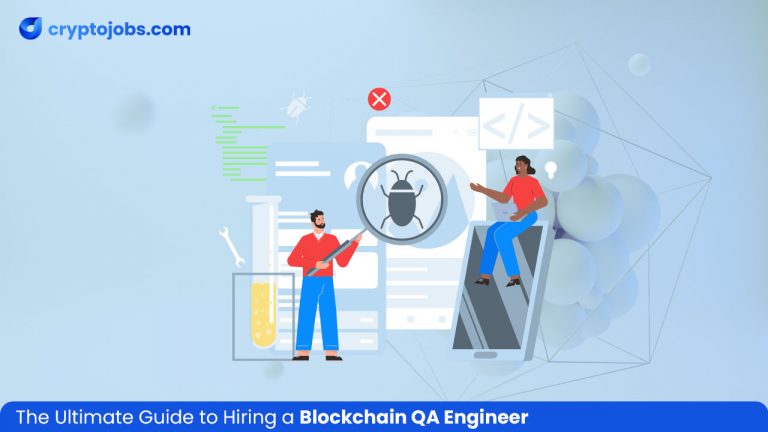
The Ultimate Guide to Hiring a Blockchain QA Engineer
- cryptojobs.com
- April 8, 2024
- All Posts, Hiring Advice
- hiring
- 0 Comments
The importance of quality assurance (QA) engineers has grown in the quickly changing technology sector, especially in specialized fields like blockchain development. The need to guarantee blockchain-based software applications’ security, functionality, and dependability drives the demand for Blockchain QA engineers.
Blockchain QA engineers are essential to ensuring software products are secure before end customers receive them, much like traditional QA engineers. However, they also cover blockchain technology’s special difficulties, such as decentralized design, consensus processes, and smart contract functionality, going beyond traditional software testing approaches.
Since few experienced applicants are available and the work is technically complicated, hiring a Blockchain QA engineer requires a sophisticated approach. Organizations must sift through a pool of people with various backgrounds and skill sets to identify the best match for their unique needs.
This article gives a thorough overview of the most important factors to take into account when hiring a Blockchain QA engineer.
What is the Role of a QA Engineer?
When it comes to guaranteeing the dependability and caliber of a business’s software offerings, a QA engineer is essential. They ensure that every product complies with legal requirements and organizational goals. Unlike external auditors who operate independently, blockchain QA engineers collaborate with the development team throughout the software development lifecycle. Establishing a solid rapport with developers and managers is crucial for effectively implementing software projects in an organization.
Understanding the Distinction between QA Engineer, Analyst & Tester
A blockchain QA engineer’s primary duty is to ensure the quality of finished goods. This function requires a strong grasp of development frameworks and code to create and run tests at different phases of the product development lifecycle. Automation and framework development are essential competencies for blockchain QA engineers as they provide effective and comprehensive testing processes.
On the other hand, before any code is produced, a QA analyst concentrates on evaluating the requirements and business logic of a new application. Their main responsibilities include assessing business requirements, formulating high-level development plans, and creating use cases for manual testing conceptual ideas to ensure they are viable.
Check out: How to Successfully Recruit Web3 QA Engineers
A quality assurance tester usually works in a more entry-level role, focusing more on test execution than planning or developing frameworks. Bigger teams may engage multiple QA testers, with each one having distinct task phases of software development.
How to Evaluate a Candidate for the Role of Blockchain QA Engineer?
It is critical to evaluate a blockchain QA engineer’s hard and soft skills in relation to the particular project needs to ensure that a recruit is a good fit for the team and capable of handling organizational and self-management tasks.
- Communication: QA engineers need to be able to interact with technical and non-technical stakeholders in equal measure.
- Teamwork: Product development goes more smoothly when you are a team member. In order to recognize possible hazards and work together to solve them, this calls for collaboration, patience, and attentive listening.
- Proactiveness: QA engineers should advocate for better user experiences and persuade developers to make the required changes while keeping end users in mind.
- Critical Thinking: QA engineers who possess this skill are able to balance user expectations and technological needs, coming up with effective solutions and viewpoints in difficult circumstances.
- Adaptability: Because software development is a dynamic process, blockchain QA engineers must be able to quickly adjust to shifting industry standards and customer requests without interfering with business operations.
- Open-mindedness and Attention to Detail: Quality assurance engineers should have an acute sense of detail, scanning for possible problems and areas for improvement from several angles. They need to be creative in coming up with new uses for products and refining testing procedures to surpass quality requirements.
Interview Questions to Ask When Recruiting a Blockchain QA Engineer
It is time to invite applicants for interviews to learn more about their prospective fit inside your organization once you have determined which ones have the most promising skills and team fit. The purpose of the following interview questions is to delve into different facets of candidates’ qualifications and fit for the position of blockchain QA engineer. These questions offer a general structure that may be tailored to meet your unique needs and goals, and they are suitable for any role involving QA engineers.
This question evaluates candidates’ grasp of testing concepts and capacity to create a precise testing plan suited to particular projects. Applicants should describe how they identify testing requirements, rank the importance of various testing components, and discuss whether automated or manual testing is more suitable for a given stage of development.
Candidates should state the criteria necessary to proceed to the next phase and explain how the exit criteria change during the development process. Subsequent inquiries may delve into the rationale behind candidates’ selected success rates and their approaches to reducing the likelihood of delays or errors.
Applicants should demonstrate that they can solve problems and accept responsibility for handling difficulties in production settings. They should highlight how to learn from past errors to guide testing strategies going forward and demonstrate how they may adjust and advance in response to real-world difficulties.
Discover a plethora of opportunities on cryptojobs.com and locate qualified applicants with a Blockchain QA engineer specialization. Simplify the hiring process and locate the ideal candidate for your organization.




